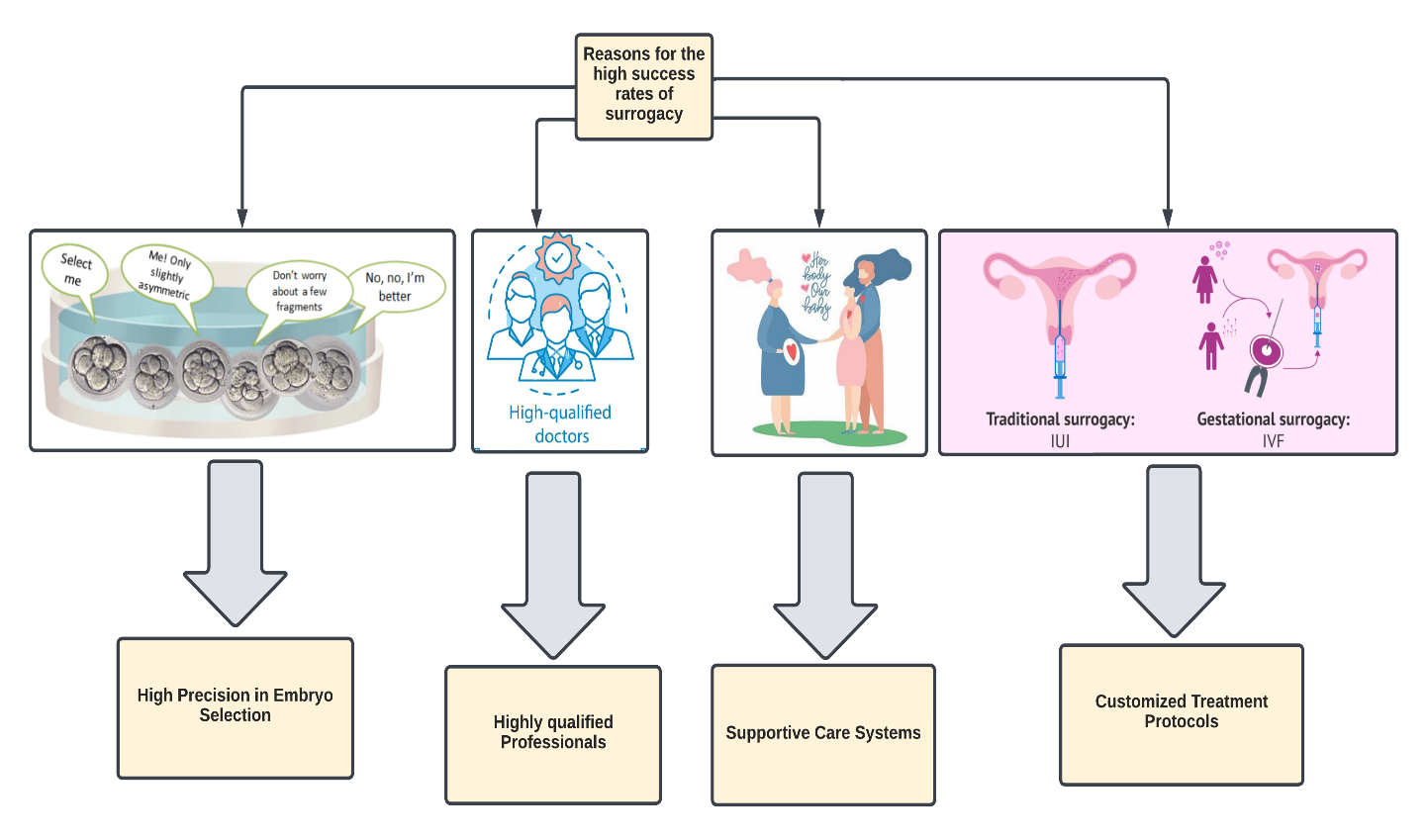Guaranteed Surrogacy in India | Surrogacy Cost in India - Vinshealth
What is Surrogacy?
Surrogacy is a process, where a woman called a surrogate mother carries a child on behalf of another couple called the intenSurrogacy cost in India is affordable and effective.ded parents. Both the intended parents or at least either of the parents are genetically connected and are the legal parents of the child.
Types of Surrogacies
Surrogacy in India is of two types- Gestational Surrogacy and Traditional Surrogacy.
- Gestational Surrogacy: This type of surrogacy is widely performed in India. The embryo is formed through IVF using sperm and eggs from the intended parents or a donor. The embryo formed is then implanted inside the uterus of the surrogate.Surrogacy Cost in India
- Traditional Surrogacy: This is the traditional form of Surrogacy where the eggs are of the surrogate only and the sperm is obtained from the intended father or the donor. The surrogate is the biological mother of the child. Nowadays, this is rarely performed in India.
How does surrogacy work with Vinshealth?
The process of Surrogacy at Vinshealth starts with analyses of your needs with the surrogate, which is followed by choosing the healthy surrogate for the center. From our end, we evaluate the surrogate’s physical and psychological conditions, which is then followed by a meeting of the surrogate and the intended parents for better understanding and the signing of the legal agreement. After the medical screening of the surrogate as well as the intended parents, the next step is to perform the IVF using different options:
- Using self-eggs and the intended father’s sperm
- Using donor eggs and the intended father’s sperm
- Using donor sperm and self-eggs
The embryo formed is then implanted inside the uterus of the surrogate, and if required, we give medications to the surrogate on priority to thicken the uterine wall for better implantation.
The child, after the birth, is the legal child of the intended parents.
Who needs Surrogacy?
Some of the possible reasons why you might need surrogacy are listed below
- If you are facing an infertility problem due to some medical reason and cannot conceive through natural means.
- If you are diagnosed with a genetic disorder or any chronic disease, that makes you unable to fulfill your parenthood dream conventionally.
- When you cannot conceive due to possible risk of health or if you have been through multiple miscarriages or IVF cycles.
- Surrogacy can also be considered by a woman who has undergone a hysterectomy or does not have a uterus to carry a child.

Who is eligible to opt for Surrogacy?
The surrogacy process is regulated by the Surrogacy laws of India which include, minimum legal age, marital status, and medical necessity. The most important factor of all is that surrogacy in India is limited exclusively to Indian citizens and people holding OCI cards.
Eligibility criteria for surrogacy in India include:
- Marital Status: Indian couples can opt for Surrogacy in India after they have been at least married for five years.
- Age: It should be within the age of 23-50 years for the intended mother and 26-55 years for the intended father
- Surrogacy for divorced and windowed women: A divorced and widowed woman can take advantage of surrogacy from 35-45 years of age.
- Medical necessity: an actual medical requirement for the couple to enter into surrogacy must exist in the laws with medical records available.
How is a Surrogate mother selected and arranged?
We ensure your comfort and satisfaction, by providing the best surrogate arrangements to you keeping your priorities and preferences into consideration as well as those of the surrogate.
- After you have chosen the surrogate, and keeping the surrogate legal age of 25 to 35 years in mind, the very first step towards surrogacy is completing the legal procedure and getting approval from the board.
- Followed by screening the surrogate through various clinical tests to assess the physical and psychological health of the surrogate.
- Surrogate arrangement can be done in two ways:
- A Surrogate is often arranged by the clinics or the agencies involved in ART (Assisted Reproductive Technology)
- A Surrogate can also be arranged by the intended parents themselves, which is a form of surrogacy called Altruistic Surrogacy.
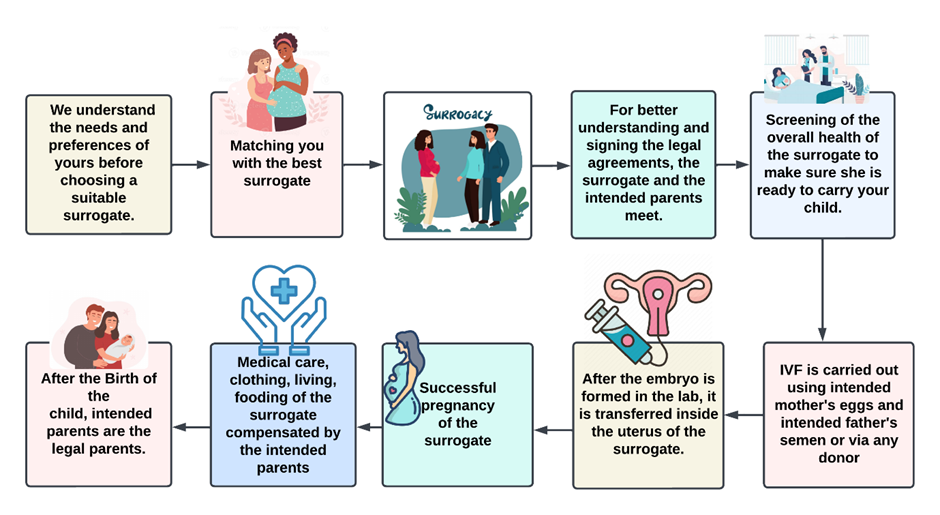
What is included in the surrogate mother’s compensation?
Surrogate mothers receive monetary compensation for medical expenses, dietary requirements, clothing, and travel expenses. Where payments can vary depending on different factors:
- Clinic and medical procedures
- Surrogate’s medical history
- Experience of the surrogate mother
- And complexities related to the health of the surrogate mother
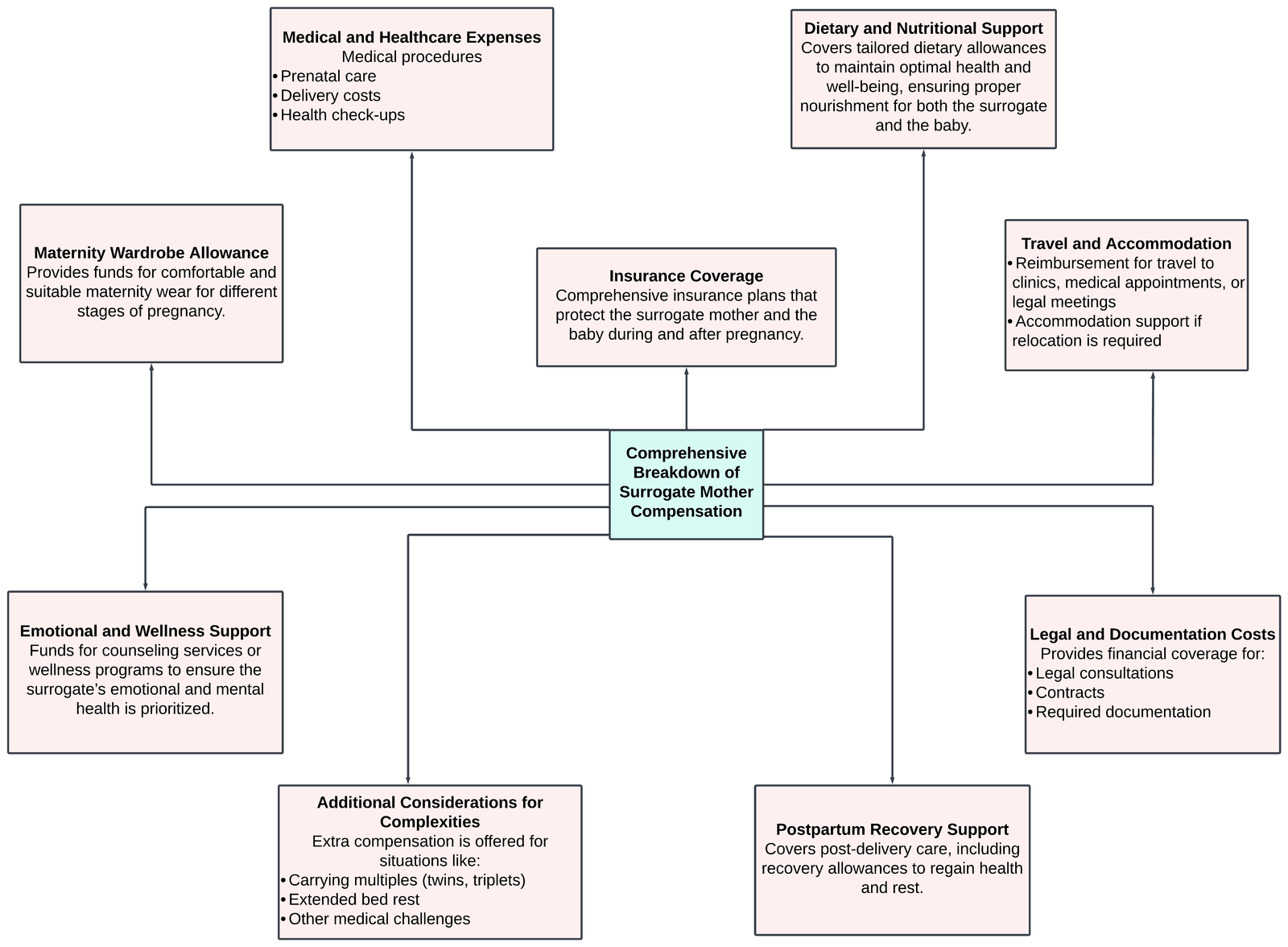
Treatments involved in Surrogacy
Some of the common ART treatments are IVF, IUI, ICSI, and PGT. Each procedure is adopted to improve the couple's chances of successful conception in cases where the couple faces some challenges in conceiving.
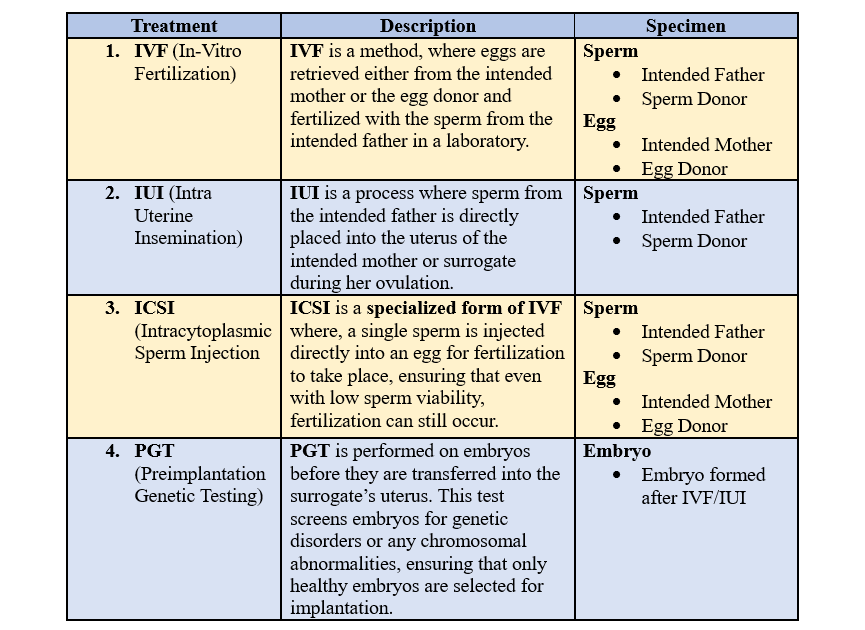
Guaranteed Surrogacy Program in India
A well-elaborated package that will guarantee your dreams of having a family come through as it includes multiple embryo transfers and extra IVF cycles wherever the process is long but smooth.
After matching you successfully with a well-reviewed surrogate, our dedicated teams also organize your medical care, thus reducing risks and increasing the chances of a successful pregnancy. Under this program, we work within a single fixed cost wherein all medical treatments, legal procedures, and surrogate support would be included to relieve your financial stress.
Key features of the Guaranteed Surrogacy program
1. Multiple Embryo Transfers
2. Additional IVF Cycles
3. Miscarriage Coverage
4. Surrogate Matching
5. Complete Testing and Screening
6. Live Baby Birth Assurance
7. Legal Permissions and Protections
8. Comprehensive Insurance Coverage
9. Emotional and Psychological Support
10. Dedicated Coordinator
11. Financial Transparency and Fixed Pricing
12. Post-Birth Support
Comprehensive Medical Tests for Female and Male Partners
Both the intended mother and the intended father must undergo thorough medical examinations including tests to assess their reproductive health to ensure that both parents are ready for the surrogacy process physically.
- Medical Tests for Female Intended Parents for Guaranteed Surrogacy Program
|
Protocols |
Test |
Definition |
Specimen |
|
Ovarian Reserve Testing |
Anti-Müllerian Hormone (AMH) Test |
It analyses the amount of AMH, the hormone that shows how much egg supply is left. |
Blood sample.
|
|
Follicle-stimulating hormone (FSH) Levels |
It measures the level of FSH, which affects reproductive function. |
Blood sample. |
|
|
Antral Follicle Count (AFC)
|
Counts the number of small follicles, present in the ovaries to check the number of eggs. |
Pelvic ultrasound. |
|
|
Genetic Testing |
Karyotyping |
Examines the chromosome structure to identify genetic abnormalities. |
Blood sample or tissue sample. |
|
Genetic Carrier Screening |
Screens for carrier status of hereditary disorders. |
Blood sample or saliva |
|
|
Hormonal Testing |
Thyroid Function Tests
|
Measure thyroid hormone levels (for example TSH, T3, T4). |
Blood sample. |
|
Prolactin Levels
|
Measures levels of prolactin, a hormone with relation to fertility and menstrual health. |
Blood sample |
|
|
Estrogen and Progesterone Levels |
Monitors levels of estrogen and progesterone, key reproductive hormones. |
Blood sample |
|
|
Infectious Disease Screening |
HIV, Hepatitis B & C, Syphilis |
Screens for infectious diseases that may affect either the pregnancy or the surrogate. |
Blood sample |
|
Rubella and Cytomegalovirus (CMV) |
Checks for immunity or active infection for prevention of congenital infections in the baby. |
Blood sample |
|
|
Pelvic Ultrasound |
Transvaginal Ultrasound |
Uses an ultrasound probe placed vaginally to view reproductive organs. |
No physical specimen; imaging examination. |
|
Blood Type and Rh Factor |
|
It checks blood type and Rh factor which should be known before conception. |
Blood sample |
|
Comprehensive Medical History Review |
|
Elaborate review of personal and family health history to identify any risk factors. |
No physical specimen; assessment through documentation and consultation. |
- Medical Tests for Male Intended Parents for Guaranteed Surrogacy Program
|
Protocols |
Test |
Definition |
Specimen |
|
Analysis |
Semen Analysis |
This test measures sperm count, motility, and morphology for an assessment of fertility. |
Semen sample. |
|
Genetic Testing
|
Karyotyping |
Detects chromosomal abnormalities |
Blood sample |
|
Genetic Carrier Screening |
Determines the existence of hereditary genetic disorders. |
Blood sample or saliva. |
|
|
Infectious Disease Screening |
HIV, Hepatitis B & C, Syphilis |
Determine infectious diseases that affect fertility or the safety of pregnancy. |
Blood sample |
|
Rubella and Cytomegalovirus (CMV) |
Testing for immunity or active infection. |
Blood sample |
|
|
Additional STD Screening (Chlamydia, Gonorrhea) |
Identify sexually transmitted infections. |
Urine sample or urethral swab |
|
|
Blood Type and Rh Factor |
|
Determine blood type and Rh to determine compatibility in pregnancy. |
Blood sample |
|
Hormonal Testing |
Testosterone Levels |
Testosterone levels are measured to check on the state of reproductive features. |
Blood sample |
Surrogacy cost in India
Surrogacy cost in India is affordable and effective. Surrogacy cost in India is around Rs. 15 lakhs to Rs. 20 Lakhs. This cost covers medical expenses, the surrogate mother's compensation, and legal costs.
Factors affecting the cost of Surrogacy in India are:
- Location of the Surrogacy Center: The surrogacy clinics in Mumbai located at premiere locations charge more fees than other clinics at different locations.
- Surrogate's Medical Conditions: A surrogate with health complications requires some advanced additional treatments.
- Number of implant cycles fails: Some clinics provide multiple IVF attempts at a fixed price.
- Legal complications: Complications with the legal process increase the overall cost.
- Multiple births and Cesarean: Twin births and Cesarean cases increase the overall cost.
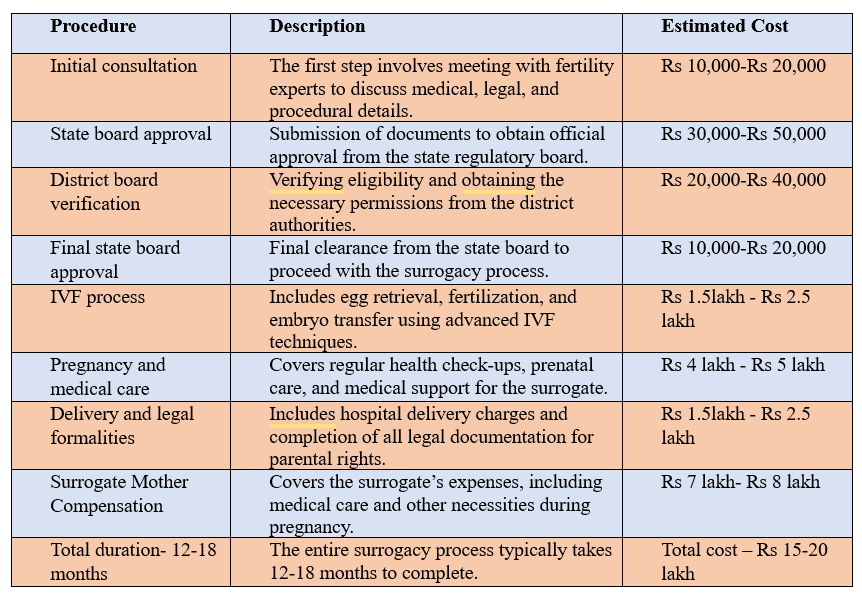
Cost comparison of Surrogacy cost in the different cities in India.
|
S. No. |
City |
Cost |
Note |
|
1. |
Surrogacy cost in Delhi |
INR 18 Lakhs-23 Lakhs |
Known for advanced medical facilities and affordable surrogacy packages, attracting international clients. |
|
2. |
Surrogacy cost in Mumbai |
INR 18 Lakhs-22 Lakhs |
A hub for high-quality clinics with top-notch IVF specialists and comprehensive surrogacy services. |
|
3. |
Surrogacy cost in Kolkata |
INR17 Lakhs-22 Lakhs |
Provides affordable options, with clinics focused on legal and ethical surrogacy practices. |
|
4. |
Surrogacy cost in Bangalore |
INR17 Lakhs-20 Lakhs |
Renowned for cutting-edge technology and successful surrogacy outcomes, catering to NRIs and locals. |
|
5. |
Surrogacy cost in Hyderabad |
INR 17 Lakhs-22 Lakhs |
Offers cost-effective surrogacy treatments with advanced infrastructure and experienced professionals. |
|
6. |
Surrogacy cost in Pune |
INR 15 Lakhs-20 Lakhs |
Emerging as a center for ethical and affordable surrogacy practices with personalized care. |
|
7. |
Surrogacy cost in Chandigarh |
INR 18 Lakhs-21 Lakhs |
Known for transparent and patient-focused surrogacy services in a tranquil environment. |
|
8. |
Surrogacy cost in Chennai |
INR 17 Lakhs- 20 Lakhs |
Offers state-of-the-art reproductive treatments with a strong emphasis on ethical guidelines. |
Surrogacy Payment Schedule In India
We believe that finances should not inhibit you from beginning your family. That's why we've created a flexible installment payment plan designed to ease your journey through the surrogacy process. Our payment schedule outlines all the costs associated with surrogacy. We have broken down all the associated costs you need to fill during the surrogacy process up until the end of the process. You don't have to pay everything in one go. The overall cost is around ₹15 - ₹20 lakhs, and an open breakdown helps you realize the monetary requirement with the extensive care and support you would be receiving through.
|
|
|
||||
|
Viral Marker (HIV, VDRL, HCV, HBSAG) |
2–3 weeks |
1,00,000 lakhs |
||||
|
Blood Group, RBS, CBC, LFT, KFT |
3–4 weeks |
1.5,00,000-2,00,000 lakhs |
||||
|
Fetal Sac Scan |
5–6 weeks |
2,00,000-3,00,000 lakhs |
||||
|
Fetal Cardiac Activities |
6–7 weeks |
5,00,000-6,00,000 lakhs |
||||
|
NBNT Scan |
11–12weeks |
1.5,00,000-2,00,000 lakhs |
||||
|
Double Marker Blood Test for Down Syndrome |
15–18 weeks |
2,00,000-3,00,000 lakhs |
||||
|
Level 2 Scan |
18–20 weeks |
50,000-1,00,000 lakhs |
||||
|
Fetal Eco |
23–24 weeks |
1.5,00,000-2,00,000 lakhs |
||||
|
Routine Scan |
28–30 weeks |
50,000-1,00,000 lakhs |
||||
|
Routine Scan |
34–36 weeks |
3,00,000-4,00,000 lakhs |
||||
|
Total cost 12 - 18 months |
15-20 lakhs |
|||||
Low-cost surrogacy centers In India
1. Vinsfertility Centre, Delhi
- Address & Directions: H. No. 133, Room No. 208, Rajdhani Power Station, South, behind BSES, Phase 1, Block C, Katwaria Sarai, New Delhi, Delhi 110016
- IVF Doctors: Dr. Sunita Singh Rathore, Gynecologist & IVF Specialist
- In Vitro Fertilisation (IVF) Cost: Rs.114,000 to Rs. 253,000
- Intrauterine insemination (IUI) Cost: Rs. 6,000 to Rs. 44,000
- Surrogacy Cost: Rs. 18 lakhs to Rs. 20 lakhs
- Modes of Payment: Credit Card | Cash | Cheque | Online Payment | Debit Card
- Baby DNA Report (Additional Cost): ₹15,000 This test is conducted post-delivery. The lab will collect samples from both the baby and the parents. The report will be available within two days.
- Legal Charges: 2 lakhs (In 2023, under the governance of India, the legal charges have been updated to 2 LAKH Rupees. Additionally, birth certificates will now be exclusively issued by the Cour)
- Services Offered: IVF, IUI, ICSI, Surrogacy, Infertility Treatments, etc.
- Reviews & Rating: 4.6 – 348 Google reviews
- Fertility Success Rate: 80%
- Book Free Appointment: +91 8448879134
2. Elixir Fertility Center, India
- Address & Directions: #5, Vardhaman Royal Plaza, LSC Gujranwala Town 1, New Delhi, Delhi 110009
- Surrogacy Doctors: Dr. Puneet Kochhar (Gynaecologist & IVF Specialist)
- In Vitro Fertilisation (IVF) Cost: Rs.150,000
- Intrauterine insemination (IUI) Cost: Rs.24,000
- Surrogacy Cost: Rs18 lakh to Rs20 lakh
- Modes of Payment: Credit Card | Cash | Cheque | Online Payment | Debit Card
- Baby DNA Report (Additional Cost): ₹17,000 This test is conducted post-delivery. The lab will collect samples from both the baby and the parents. The report will be available within two days.
- Legal Charges: 2 lakhs (In 2023, under the governance of India, the legal charges have been updated to 2 LAKH Rupees. Additionally, birth certificates will now be exclusively issued by the Court)
- Surrogate Mother Cost: Rs.3,00,000 to Rs.5,00,000
- Services Offered: IVF, IUI, ICSI, Surrogacy, etc.
- Reviews & Rating: 4.7 – 168 Google reviews
- Fertility Success Rate: 80%
- Book Free Appointment: +91 8448879134
3. Delhi IVF and Fertility Research Centre, India
- Dr. Aastha Gupta (Infertility Specialist, Obs & Gynae, Gold Medalist)
- In Vitro Fertilisation (IVF) Cost: Rs.140,000
- Intrauterine insemination (IUI) Cost: Rs.21,000
- Surrogacy Cost: Rs18 lakh to Rs20 lakh
- Modes of Payment: Credit Card | Cash | Cheque | Online Payment | Debit Card
- Baby DNA Report (Additional Cost): ₹16,000 This test is conducted post-delivery. The lab will collect samples from both the baby and the parents. The report will be available within two days.
- Legal Charges: 2 lakh (In 2023, under the governance of India, the legal charges have been updated to 2 LAKH Rupees. Additionally, birth certificates will now be exclusively issued by the Court)
- Surrogate Mother Cost: Rs.4,00,000 to Rs.5,00,000
- Services Offered: IVF, IUI, ICSI, Surrogacy, etc.
- Reviews & Rating: 4.6 – 493 Google reviews
- Fertility Success Rate: 80%
- Book Free Appointment: +91 8448879134
4. Akanksha IVF Centre, India
- Address & Directions: IVF Specialist Dr. K.D. Nayar Room No 711, Mata Chanan Devi Hospital, C-1 Block, Janakpuri, New Delhi, Delhi 110058
- Surrogacy Doctors: Dr. K.D Nayar (IVF Specialists), etc.
- In Vitro Fertilisation (IVF) Cost: Rs.150,000
- Intrauterine insemination (IUI) Cost: Rs.23,000
- Surrogacy Cost: Rs17 lakh to Rs20 lakh
- Modes of Payment: Credit Card | Cash | Cheque | Online Payment | Debit Card
- Baby DNA Report (Additional Cost): ₹16,000 This test is conducted post-delivery. The lab will collect samples from both the baby and the parents. The report will be available within two days.
- Legal Charges: 2 lakhs (In 2023, under the governance of India, the legal charges have been updated to 2 LAKH Rupees. Additionally, birth certificates will now be exclusively issued by the Court)
- Surrogate Mother Cost: Rs.3,00,000 to Rs.5,00,000
- Services Offered: IVF, IUI, ICSI, Surrogacy, etc.
- Reviews & Rating: 4.5 – 127 Google reviews
- Fertility Success Rate: 80%
- Book Free Appointment: +91 8448879134
5. Morpheus Andheri International IVF Center, India
- Address & Directions: G2 G3, The Summit Business Bay, Andheri – Kurla Rd, adjacent to Cinemax, Chakala, Andheri East, Mumbai, Maharashtra 400069
- Surrogacy Doctors: Dr. Sheetal Sawankar
- In Vitro Fertilisation (IVF) Cost: Rs.150,000
- Intrauterine insemination (IUI) Cost: Rs.23,000
- Surrogacy Cost: Rs20 lakh to Rs25 lakh
- Modes of Payment: Credit Card | Cash | Cheque | Online Payment | Debit Card
- Baby DNA Report (Additional Cost): ₹16,000 This test is conducted post-delivery. The lab will collect samples from both the baby and the parents. The report will be available within two days.
- Legal Charges: 2 lakhs (In 2023, under the governance of India, the legal charges have been updated to 2 LAKH Rupees. Additionally, birth certificates will now be exclusively issued by the Court)
- Surrogate Mother Cost: Rs.4,00,000 to Rs.5,00,000
- Services Offered: IVF, IUI, ICSI, Surrogacy, etc.
- Reviews & Rating: 4.5 – 26 Google reviews
- Fertility Success Rate: 80%
- Book Free Appointment: +91 8448879134
Success Rates of Surrogacy in India
India represents hope for intended parents and provides a perfect mix of advanced medical knowledge and unwavering support throughout the surrogacy process. India has very well made its name as a main center for surrogacy, mainly due to the modern facilities used for medical treatment, affordable prices in the different medical services as well as excellent training of medical personnel. With clear legal guidelines in place, surrogacy in India is a safe and reliable option for families all over the globe.
Surrogacy Laws in India

1. Act: India formulated and implemented legislation on surrogacy with the enactment of the Surrogacy Regulation Act, 2021 as well as Surrogacy Regulation Rules 2022.
- The Act legalizes only altruistic surrogacy which in basic terms allows no compensation or any monetary gain to the surrogate mothers except for the medical and insurance costs which are incurred by the surrogate mother.
2. Eligibility: A couple opting for Surrogacy as an option should be married for 5+ years.
- Couples with a surviving biological child are generally allowed to pursue surrogacy only under exceptional circumstances.
3. Medical Records: The act also provides that there should be some medical reason for undertaking gestational surrogacy by either the couple or both.
4. Registered clinics: The legislation stipulates that no surrogate or surrogate-related activities shall be performed in the country except in registered clinics.
5. Age: The age limit for the intended mother should be 25-50 years, whereas the age limit for the intended father is 26-55 years.
- The age limit for a surrogate mother is usually fixed in the range of 25-35 years, she should already have at least one child of her own and she has never been pregnant on someone’s behalf before.
- A widowed or divorced woman can pursue surrogacy if she falls into the age category of 35-45 years.
6. Indian Citizenship: The new law now permits all Indian citizens residing outside India, including holders of the OCI card to undertake surrogacy in India, removing earlier prohibitions
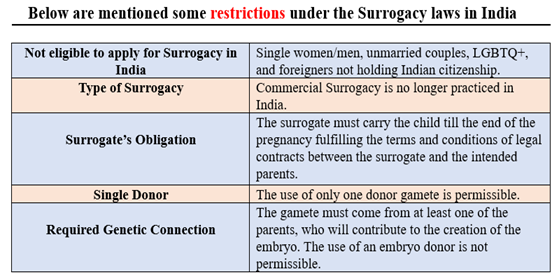
FAQs
1. Why should I choose India for Surrogacy?
Ans: India is chosen for surrogacy by many people worldwide because it provides low-cost surrogacy packages with a high success rate. Surrogacy laws in India are strict and hassle-free to abide by.
2. What is the average cost of surrogacy in India?
Ans: Surrogacy costs in India range from INR 15 Lakhs to INR 20 Lakhs. It depends on factors like city, location, medical services, the number of IVF cycles, and legal procedure.
3. Is the baby genetically linked to the intended parents?
Ans: Yes, the baby carried by the surrogate is genetically linked to the intended parents because the eggs and sperm in most cases are collected from the intended parents.
4. What is the success rate of surrogacy in the first IVF attempt?
Ans: The cases where surrogate pregnancy came positive in the first IVF attempt are rare. So, we generally suggest patients to opt for the package including at least 2-3 IVF attempts.
5. Can I bring my surrogate for the surrogacy process in India?
Ans: Yes, you can bring your surrogate, which will give you some cost relaxation as well. The surrogate needs to be taken care of throughout pregnancy by you.

